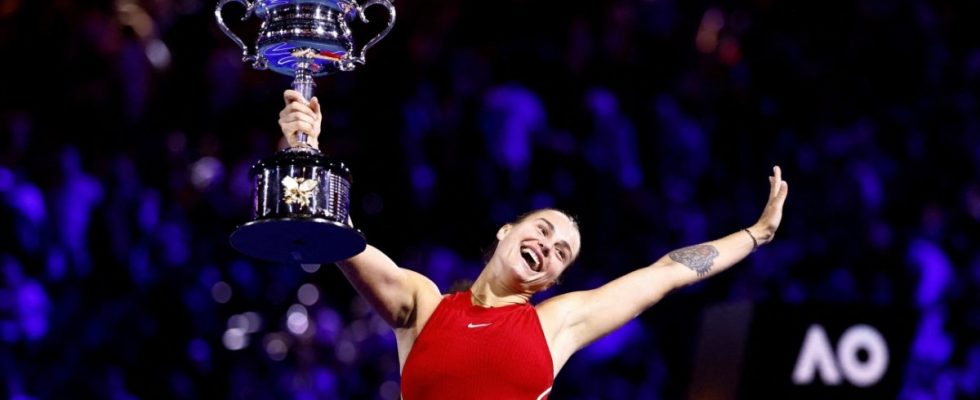The wisdom of Chinese scholars is infinite, but Qinwen Zheng, 21, listened to Li Na on Saturday evening: the only tennis player from the great empire who had already played a final in the Rod Laver Arena before her. Li Na, invited as a guest in Melbourne, gave her advice that was less philosophical than pragmatic: “Don’t think too much! Just go for it!”
For all its conceptual simplicity, it was probably the only appropriate strategy to be able to survive on the court against Aryna Sabalenka, 25, from Minsk, the old and new Australian Open winner. In recent years, Sabalenka has revived power tennis, once a Serena Williams specialty. She thrashes the balls over the net with maximum power, each shot accompanied by a fearsome, throaty sound. Qinwen Zheng, who will reach the top ten of the world tennis rankings for the first time next week, held on bravely. She hit six aces and 19 straight winning strokes – and was still hopelessly inferior.
After an hour and fifteen minutes, defeated 3:6, 2:6, Zheng sat on the bench at the edge of the field and buried his face in a white towel for several minutes while the beams of spotlights on the blue court circled around the beaming Sabalenka. When she was asked to take the microphone at the awards ceremony, she had collected herself. It was her first Grand Slam final, she said with Confucian sincerity. “I need some comfort.” She can play better and wants to prove it at the next opportunity.
Zheng has a forehand with dangerous spin. Shortly before, when Sabalenka served to win the title, she had fended off two match points. On the third match point she saved herself with a stop, while in the stands the considerable Chinese spectators waved red flags and once again loudly chanted, “Jiayou!” (“Let’s go!”) intoned. Sabalenka, who had become nervous, hit the fourth match point into the net herself, and then Zheng even earned a break point. The defending champion threw annoyed looks around and countered with a thunderous ace. Shortly afterwards, she chased the ball across the field, out of reach, for victory. She is now the first to have her name engraved on the trophy twice in a row since Wiktoria Asarenka, also from Belarus, won in 2012 and 2013.
Sabalenka hopes for even more Grand Slam titles
With the giant Daphne Akhurst Memorial Cup in her arms, Sabalenka thanked her family and her long-time coaching team, including Anton Dubrov, who was her former hitting partner, and Australian Jason Stacy, her fitness coach. They not only cured the tremors that plagued her sporadically before her first Australian Open victory and improved her forehand and backhand, but they also helped her to internalize the self-confidence of a champion. In the past, Sabalenka said in Melbourne recently, she was often surprised when complete strangers asked her for autographs, “I was just a normal tennis player.” Now she’s a Grand Slam champion, twice in fact, and on a mission, as Jason Stacy said: “Her job on the court is to set the pattern, set the rhythm and make it clear that she’s in it to win, no matter what happens. She shouldn’t have to worry about yesterday or the day before yesterday.”
With this attitude, Sabalenka, number two in the world rankings, rushed through the tournament like a tornado. In the third round she swept the unfortunate Lessya Tsurenko 6-0, 6-0 in 52 minutes. She didn’t let herself be deterred and didn’t drop a set in seven matches. Not even in the semifinals against Coco Gauff from the USA, against whom she lost the final of the US Open in the fall. And that’s not the end of it, she hopes to win a few more titles, she said on Saturday evening.
Qinwen Zheng will now move into the top ten of the world rankings.
(Photo: Asanka Brendon Ratnayake/AP)
The defeated Qinwen Zheng was the first finalist in four decades who did not have to defeat an opponent who was ranked higher than 50th in the world rankings on the way to the final – but that is not her fault, but rather the course of the tournament. She now has her former coach Pere Riba at her side again, who accompanied Coco Gauff on the way to the Grand Slam victory in New York in September. When the storm of emotions has subsided, she will understand what she has achieved in these two weeks.
And perhaps Li Na, the two-time Grand Slam winner from China, will give her some further advice: La Ni lost the final in Melbourne twice in 2011 and 2013 – before she grabbed the giant trophy in 2014.

